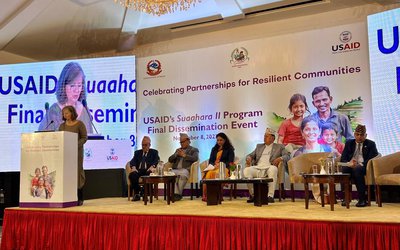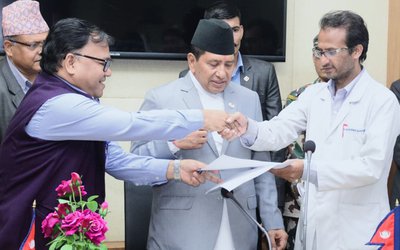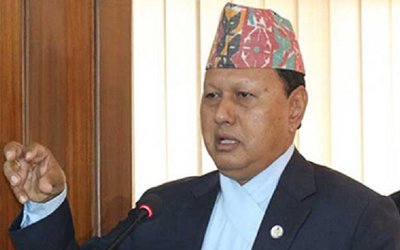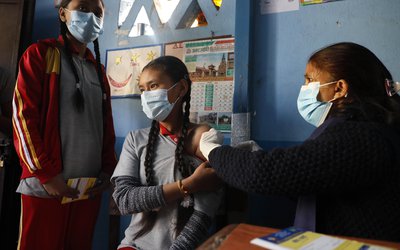As health is a priority sector of Nepal government, all organizations like NGOs, INGOs and UN agencies have been bringing the projects to support Nepal’s goal to achieve the target.
The projects and programs range from curative to preventive, depending upon the place and situation. However, Green Tara Nepal (GTN), in collaboration with two UK universities, has presented the findings of its long-term maternal project, plus a review of health promotion in (a) government policies and strategies and (b) the curricula of university-based health courses in Nepal.
At a function inaugurated by Minister for Health and Population Gagan Thapa, speakers working in the health sector highlighted various successes and lacunas in Nepal’s health sector programs and projects.
“Ministry of Health is ready to work with Green Tara Nepal and similar institutions to provide basic health for all,” said the minister. “It is good to see the approach of Green Tara Nepal to drive community.”
Despite achieving some success, maternal health is still one of the major challenges of Nepal. This is where Green Tara Nepal is also focusing.
Dr. Jane Stephens, from Green Tara Trust (London), presented some of the findings from its long-term maternal health promotion intervention in Dakhinkali and Chhaimale. Dr. Stephens stated, “GTN has shown that interventions based on health promotion principles using women’s groups can be effective in the community.”
Ms. Colette Fanning, the GTT Director, noted, “GTN’s current health promotion intervention in Nawalparasi focuses on the improvement of Government-run birthing centers and we are happy to announce that it is showing promising interim results.”
Ram Chandra Silwal, Country Director GTN, presented findings of key health-related policies of the past two decades. He observed that “The definition of health promotion or a description of the concept is generally missing in policy documents although these may cover aspects of health promotion.”
Prof. Dr. Edwin van Teijlingen (Bournemouth University, UK) observed, “One of the strengths of Green Tara’s approach is its collaboration with UK universities for its research. Several excellent MSc and PhD students have been, and some still are, contributing to the health promotion evidence base.”
Prof. Dr. Padam Simkhada (Liverpool John Moores University, UK) highlighted, “One of Nepal’s key challenges is the existing health inequality in Nepal.”
He added that: “The country has some good policies and reasonably well planned systems, but the implementation is often poor.”
“Our review of curricula of university-based health courses in Nepal (2014-15) showed only half (9 out of 17) undergraduate health courses included the term, definition and concept of health promotion in their curricula,” said Dr. Simkhada.
As Nepal is moving to a federal state, we need to consider combining national and federal planning with a bottom-up approach to policy-making. Some health promotion issues are national or even global, whilst others are regional or local problems. One of the key elements of health promotion is empowerment, which is an idea that needs to be incorporated into the policy-making.
Attended by a range of directors of NGOs, INGOs, the Government of Nepal, and many other stakeholders, including the media, the workshop discussed the model applied by Green Tara Nepal. “This dissemination workshop follows on from the First National Health Promotion Conference in Nepal, which we jointly organized in early 2013. The conference brought together nearly 300 people for the first time to discuss key issues in health promotion,” said GTN Chair Krishna Lamsal.
As Nepal lacks the country centric data on effectiveness of health promotion interventions, with no clear health promotion training and no national health promotion policy, the entire programs have been suffering.
A significant burden of disease that is avoidable via health promotion exists as curative treatment is expensive and unobtainable in rural areas.
According to the approach paper prepared by the Green Tara Nepal, with a little money in health system, concentrated on curative approach, effective work is difficult to find.
They stressed that the health requires political action, broad participation and sustained advocacy as stated in Bangkok Charter 2005 globalized health promotion agenda. Policy and systems need to be informed by good quality evidence from field and vice versa. All forms of good quality evidence should be included- qualitative, quantitative, case studies, lessons from implementation of programs. Opportunities for dialogue between levels, where all are seen as equally valuable, need to be created.
At a time when Minister of Health Thapa is stressing accessible health to all, Green Tara Nepal’s approach will be a model on how to address the health problems by mobilizing the community.
- TANAHU HYDROPOWER PROEJCT: A Significant Achievement
- Apr 15, 2024
- AMBASSADOR HANAN GODAR: Sharing Pain With A Nepali Family
- Mar 30, 2024
- VISIT OF KfW AND EIB TO NEPAL : Mission Matters
- Mar 25, 2024
- NEPAL BRITAIN SOCIETY: Pratima Pande's Leadership
- Mar 24, 2024
- NEPAL ARMY DAY: Time To Recall Glory
- Mar 15, 2024
















